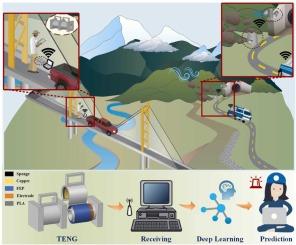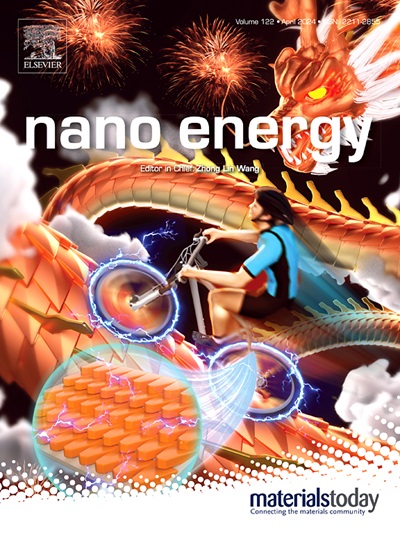基于具有多种传感功能的三电纳米发电机的深度学习辅助自供电无线环境监测系统
IF 16.8
1区 材料科学
Q1 CHEMISTRY, PHYSICAL
引用次数: 0
摘要
自三电纳米发电机(TENG)发明以来,研究人员利用这项技术促进了风能和振动等环境能量的采集,以及风速和地质变化等环境参数的传感,从而开发出了自供电环境监测系统。然而,复杂多变的自然环境要求系统不仅要完成各种监测任务,还要具备远程和瞬时无线传感能力。本研究提出了一种基于可配置旋转开关 TENG(RS-TENG)的自供电无线环境监测系统,该系统集成了深度学习算法,能够进行多参数环境监测。RS-TENG 可以处理风力和记录速度信息;桥梁上配备的电容式应变传感器和山体周围的电感式重量传感器也可作为监测节点,用于自然环境的多参数监测。通过谐振电路和尖端放电结构,可以稳定地传输无线信号,将重要的桥梁构件变形和落石信息传送到用户界面,以供决策之用。通过深度学习算法,该系统可检测桥梁构件的变形状态和落石预警信号,并识别确定的级别。通过采用共享风杯,RS-TENG 允许节点为电子设备供电,同时实现完全自动的无线风力监测。此外,该环境监测系统还建立了一个用户友好型可视化界面,允许用户分配监测任务并获得合理结果。这项工作为将 TENG 技术应用于复杂和特殊自然环境中的自供电无线环境监测提供了一个范例。本文章由计算机程序翻译,如有差异,请以英文原文为准。

Deep-learning-assisted self-powered wireless environmental monitoring system based on triboelectric nanogenerators with multiple sensing capabilities
Since the invention of the Triboelectric Nanogenerator (TENG), researchers have used this technology to facilitate the harvesting of environmental energy, such as wind and vibration, as well as the sensing of environmental parameters, such as wind speed and geological changes, resulting in the development of self-powered environmental monitoring systems. Nonetheless, the complex and ever-changing natural environment requires that the system not only complete a wide range of monitoring tasks but also provide remote and instantaneous wireless sensing capabilities. This work proposes a self-powered wireless environmental monitoring system based on a configurable Rotary Switch TENG (RS-TENG), which integrates deep learning algorithms and is capable of multi-parameter environmental monitoring. The RS-TENG can work with wind and record speed information; a capacitive strain sensor equipped on bridges and an inductive weight sensor plated around mountains are also considered monitoring nodes for multi-parameter monitoring in the natural environment. A resonant circuit and a tip-discharge structure allow the steady transmission of wireless signals that carry significant bridge component deformation and rockfall information to the user interface for decision-making. With deep learning algorithms, the system detects the deformation states of bridge components and rockfall warning signals and identifies defined levels. By adopting a shared wind cup, the RS-TENG allows the node to power electronic devices while enabling entirely automatic wireless wind monitoring. Furthermore, a user-friendly visualization interface is built for this environmental monitoring system, which allows users to assign monitoring tasks and get reasonable results. This work provides a paradigm for TENG technology applied in self-powered wireless environmental monitoring in complicated and particular natural environments.
求助全文
通过发布文献求助,成功后即可免费获取论文全文。
去求助
来源期刊

Nano Energy
CHEMISTRY, PHYSICAL-NANOSCIENCE & NANOTECHNOLOGY
CiteScore
30.30
自引率
7.40%
发文量
1207
审稿时长
23 days
期刊介绍:
Nano Energy is a multidisciplinary, rapid-publication forum of original peer-reviewed contributions on the science and engineering of nanomaterials and nanodevices used in all forms of energy harvesting, conversion, storage, utilization and policy. Through its mixture of articles, reviews, communications, research news, and information on key developments, Nano Energy provides a comprehensive coverage of this exciting and dynamic field which joins nanoscience and nanotechnology with energy science. The journal is relevant to all those who are interested in nanomaterials solutions to the energy problem.
Nano Energy publishes original experimental and theoretical research on all aspects of energy-related research which utilizes nanomaterials and nanotechnology. Manuscripts of four types are considered: review articles which inform readers of the latest research and advances in energy science; rapid communications which feature exciting research breakthroughs in the field; full-length articles which report comprehensive research developments; and news and opinions which comment on topical issues or express views on the developments in related fields.
 求助内容:
求助内容: 应助结果提醒方式:
应助结果提醒方式:


